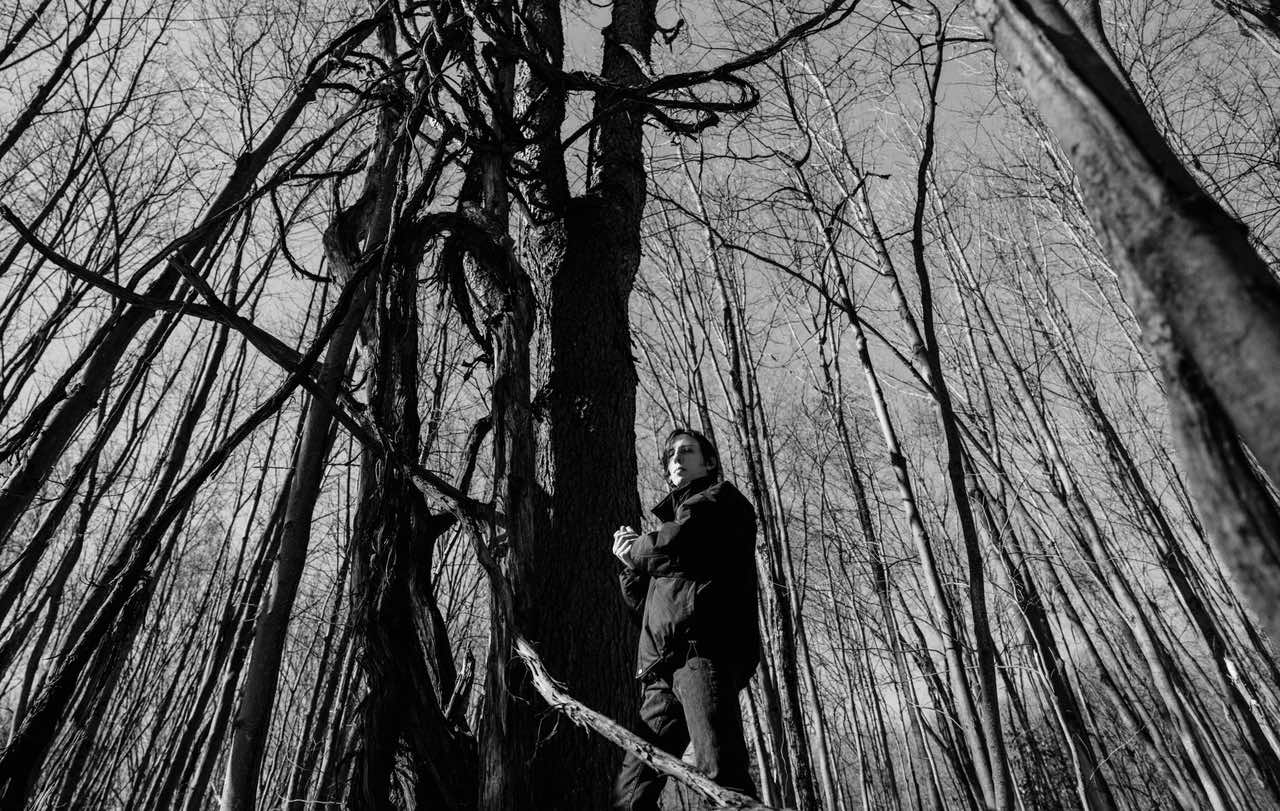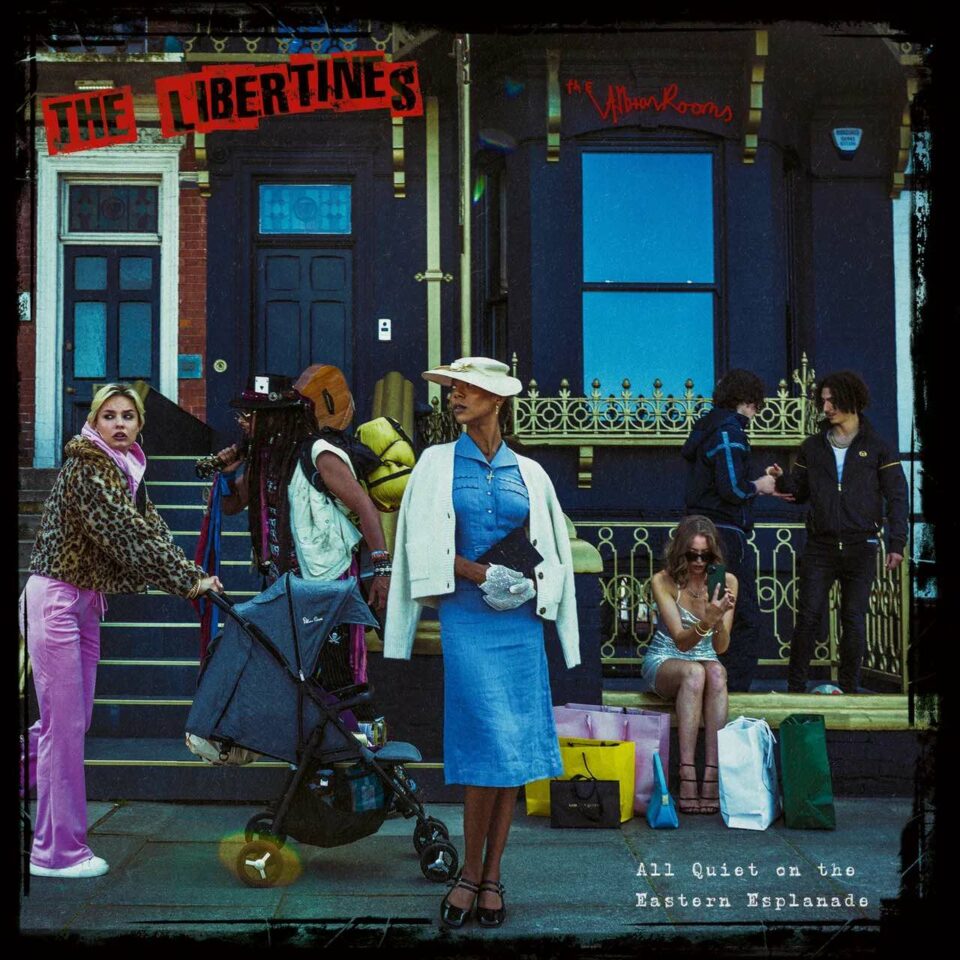Wicca Phase Springs Eternal has long been a project about world-building. Over the past decade, as Adam McIlwee has stripped the outfit of its cloud-rap and witch-house origins, what’s emerged are interesting new avenues of songwriting that dip into earnest singer-songwriter balladry and comfortably cohabitate with crossover thrash, while the aesthetic of those early genre influences (not to mention those of his previous work with pop-punks Tigers Jaw and his concurrent work with rock experimentalists Pay for Pain) continue to find their way back into the dour backwoods rituals his narratives soundtrack. In fact, the massive amount of music featuring his distinct vocals released across different monikers sort of constitutes its own vibrant universe.
But when the somber horseback-portrait album cover for his self-titled album was revealed earlier this year alongside the new-wavey lead single “Moving Without Movement,” we knew shit was about to get wild. Thanks in part to a new set of collaborators (in addition to recent production partner Darcy Baylis, who shares credit on WPSE’s 2020 This Moment I Miss EP), Wicca Phase Springs Eternal feels like a bold step even within McIlwee’s prior discography, with co-producer Ben Greenberg (currently of Uniform, formerly of The Men) lending his genre-defying ideas to each track. Whether the result is resurrecting the quicker tempos of his work with Tigers Jaw, a natural collaboration with Greenberg’s longtime Sacred Bones labelmate Zola Jesus, leaning fully into C&W imagery, or even soundtracking that imagery with an intense breakbeat, each track on the self-titled is a welcome and unexpected twist to a familiar story.
With the album out today via Run for Cover (you can purchase it here), we asked McIlwee to walk us through the project track by track, telling us which songs are about love, which are about teleportation, and which are about both. Stream along as you read his words below.
1. “Wicca Phase Springs Eternal”
I considered naming the record Wicca Phase Springs Eternal early in the writing process, but I had always wanted to name a song “Wicca Phase Springs Eternal” as well, so it makes sense that the self-titled song would go on the self-titled record. Because so much of the record is written in abstractions and has so much scene-setting, I wanted this song to represent not only what you might hear on the rest of the record, but what you might hear throughout the decade-plus of Wicca Phase music—melodrama, magic, mystery, partying, etc. I wrote seven parts to this, and I think parts two, six, and seven are what actually made the song.
2. “Moving Without Movement”
I love writing mid-/uptempo songs. A lot of my Tigers Jaw songs—“I Saw Water,” “Cool,” “Slow Come On”—have a similar tempo, and I missed being able to incorporate those types of songs in the Wicca Phase catalog. I also didn’t know how to get that type of song to fit within the context of any Wicca Phase release without having a live drummer, but Darcy Baylis and Ben Greenberg did a great job balancing live-sounding—but still programmed—drums that won’t sound like the DJ is just playing a band’s instrumental when I play this live. It’s a love song, and also a teleportation song.
3. “Twilight Miracle”
The instrumental demo for this was made in the lobby of the North Branch Inn in North Branch, NY using stock Ableton plugins because I didn’t have my external hard drive on me. It’s one of those songs where the title came first and the song was written around that, which is my preferred way of writing songs—having some sort of theme or phrase to work around, etc. This is also when I started really getting into the scene-setting aspect with the lyrics of this record, starting with a very specific point (a time, 7:15), and then zooming out to more abstract scenes from there.
4. “It’s Getting Dark”
The saddest song on the record, and largely untouched from the demo. I don’t know what to say about this one aside from it possibly being the most metaphor-heavy song I’ve written. It’s also the closest-sounding to the type of music I was listening to while making this record.
5. “Saturday Night”
A lot of this record was written in pairs, and this was an alternate to “Moving Without Movement,” in case the people I was working with on the record hated that one. Again, starting from a very specific point (a mountain highway, underneath the moon, on the first day of spring) and pulling back from there. The demo for this was significantly longer, and this song required the most editing in the studio—identifying bridges, choruses, etc.
6. “Open Portal”
This was the first or second song written for the album, and lyrically maybe the most representative of what I was hoping to accomplish on the record (aside from the self-titled song). I think this song also has two of Darcy’s best contributions to the production of the record, in the claps heading into the last chorus, and then the chord change to the major C in the outro. I also think this is a great example of what Ben did when handed a trap song, which on this record was often—but he would either strip it down entirely and rebuild it, or make small changes to make it less genre-specific. In this one, he did the latter, changing traditional trap hi-hats in the last chorus to straight 16th notes that he modulated live, replacing the pad synths with lap steels, etc.
7. “Farm”
Similar to “Saturday Night,” this was written as a counter to another song that didn’t end up making the record (released by another band I’m in, a song called “Mine and Mystic” by Pay for Pain). The original drums were a pretty simple 808 pattern, and I felt like they were holding the song back, so I’m incredibly thankful for Darcy realizing the obvious and choosing to use a breakbeat instead. Lyrically…sometimes I like to put in a line that is purposely attention-grabbing, and I thought opening with “I’m on a farm” before an aggressive beat drop comes in would work well.
8. “One Silhouette”
I have always loved dance music with emotional/dark/mysterious lyrics, but I rarely make it, so this is my attempt at a more hook-driven dance-pop song. The part after the second verse where most of the instruments drop out and the hook starts again was Ben’s idea, and I think one of his best moments on the record. The lyrics begin as an homage to the opening scene of Grease before turning into more traditional Wicca Phase lyrics, but set against a really bright and pounding instrumental.
9. “Assembly”
This was written because I was starting to worry that I didn’t have enough minor-key trap-influenced songs on the record, and I think it was the first song Ben and I worked on when I went to his studio. I love the idea of shadow societies and underground organizations operating just below the surface of everyday life, so the lyrics are an attempt to make those ideas “canon” in the world of Wicca Phase (if they weren’t already there the whole time).
10. “Now That It’s Dark”
Similar to the self-titled song and “Saturday Night,” I came into the studio with about twice as many lyrics written for this song and very little structure to it. The lyrics touch on similar themes as “Assembly,” but “Assembly” deals with the specifics of the shadow world—where its members meet, how they organize, etc.—whereas this song is dealing with the more personal (and also existential) implications of operating in the shadows. I should be clear and mention that everything I just said was not considered when I was writing these songs at all, but sometimes when a song is finished I’m able to look at the lyrics and figure out what they’re really about.
11. “Mystery, I’m Tied to You” (feat. Zola Jesus)
The companion to “It’s Getting Dark,” but a minor-key version. I had been a fan of Zola Jesus since I was in high school, and her involvement with the song came together so quickly that I still have a hard time believing it actually happened. I believe it started as a Ben suggestion that we turn it into a duet, or at least have a female vocal presence on the song. Run for Cover suggested Zola Jesus, and Ben happened to have worked with her before so he was able to reach out. The song itself came from me playing that pattern while trying to write lyrics to “Open Portal,” then building a new song with a new melody from that.
12. “Who’s Watching Me”
Another one of the earlier songs written for this record. I had wanted to try to write a song that was thematically similar to what I had finished already, but as a major-key companion that could expand upon some of the same lyrical content set against a more hopeful instrumental. It’s like…if the majority of the world that this record inhabits comes out at night, what does it look like during the day? And I hope the answer to that is that it looks like this song sounds. A lot of these lyrics ended up being used in the comic book LP insert that Matt Seneca finished before this record was even recorded, so there’s a visual companion to this song in case the naturally bright nature of this song is hard to imagine.









